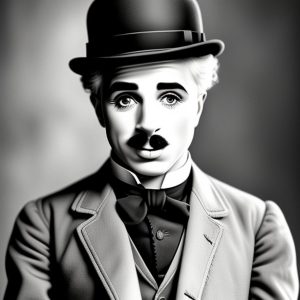Prepare to be captivated as you embark on a mesmerizing journey into the life of the legendary figure, Charlie Chaplin. Renowned for his iconic portrayal of the tramp persona, Chaplin’s name resonates throughout history as one of the greatest comic actors to ever grace the silver screen. Born in the vibrant city of London in 1889, his illustrious career spanned an impressive five decades, leaving an indelible mark on the cinematic landscape.
However, Chaplin’s path was not without obstacles. In the early 1950s, he found himself at the center of a storm, exiled from the United States. This period was marked by turmoil and controversy, as his political views and alleged affiliations with communism clashed with the politically charged atmosphere of the Cold War era.
To truly grasp Chaplin’s political beliefs, one must delve into the socio-economic landscape that shaped his worldview. Growing up amidst the shadows of poverty, he intimately experienced the hardships faced by the working class. This firsthand encounter ignited a profound empathy within him, fueling his critique of capitalism and his unwavering advocacy for social justice. Through his films, he became a champion for the ordinary people, shedding light on societal issues and capturing the struggles of the downtrodden. It is no surprise that he became an adored figure among the working class, their hero amidst the darkness.
As tensions escalated between the United States and the Soviet Union in the 1940s, a sense of suspicion loomed over the nation. The Red Scare, an anti-communist crusade, swept through the country, leaving no stone unturned. In the midst of this fervor, Chaplin found himself entangled in a web of accusations and scrutiny. His political leanings and associations with left-wing intellectuals and activists made him a prime target for those in power.
In 1947, Chaplin was summoned to testify before the formidable House Un-American Activities Committee (HUAC), a moment that would shape the course of his life forever. Under relentless questioning, he vehemently denied being a communist. Yet, his refusal to fully cooperate with the committee and his scathing criticism of their actions only fueled the fires of controversy. Branded a “sympathizer” and accused of being un-American, Chaplin’s world was shaken to its core.
The year was 1952 when the final blow was struck. While on a trip to his birthplace, London, Chaplin received the devastating news that his re-entry permit to the United States had been revoked. In one fell swoop, he was banished from the land where he had achieved monumental success. The decision to exile him was based on allegations of moral turpitude and the perceived threat his political beliefs posed to national security. It is worth noting that during this period, Chaplin’s personal life also faced relentless scrutiny, with a highly publicized paternity suit and a controversial marriage to an underage woman.
Undeterred by his exile, Chaplin continued to weave his cinematic magic in Europe. However, his once vibrant career in Hollywood was never quite the same. It would take two decades, until 1972, for the tides to turn. The political climate had shifted, and Chaplin’s remarkable contributions to the world of cinema were finally acknowledged and celebrated. In a triumphant homecoming, he was invited back to the United States to receive an honorary Academy Award, a testament to the enduring legacy he had forged.
In conclusion, Charlie Chaplin’s story is one of resilience and artistic brilliance. Through his films, he fearlessly tackled social and economic issues, becoming a beacon of hope for those on the fringes of society. While his political beliefs and alleged communist connections led to his exile during the tumultuous Cold War era, his influence as an actor and filmmaker remains unparalleled. Today, he stands as an iconic figure in the grand tapestry of cinema, forever etched in our hearts and minds.

